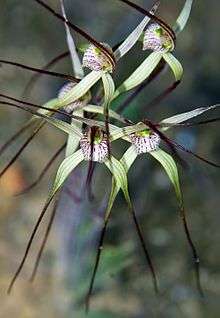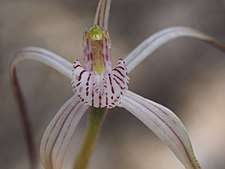Caladenia vulgata
Caladenia vulgata, commonly known as the common spider orchid, is a species of orchid endemic to the south-west of Western Australia. It is a relatively common and widespread orchid with a single erect, hairy leaf and up to three creamy-white flowers. There is some variation in the species, both in flower colour and growth habit.
| Common spider orchid | |
|---|---|
 | |
| Caladenia vulgata growing in Wongan Hills | |
| Scientific classification | |
| Kingdom: | Plantae |
| Clade: | Tracheophytes |
| Clade: | Angiosperms |
| Clade: | Monocots |
| Order: | Asparagales |
| Family: | Orchidaceae |
| Subfamily: | Orchidoideae |
| Tribe: | Diurideae |
| Genus: | Caladenia |
| Species: | C. vulgata |
| Binomial name | |
| Caladenia vulgata | |
| Synonyms[1] | |
Description
Caladenia vulgata is a terrestrial, perennial, deciduous, herb with an underground tuber and a single erect, hairy leaf, 50–150 mm long and about 4 mm wide. Up to three white or creamy-white flowers, sometimes with reddish markings, and 100–150 mm long, 70–100 mm wide are borne on a stalk 150–300 mm high. The dorsal sepal is erect, 45–90 mm long and 2–3 mm wide. The lateral sepals and petals are 45–90 mm long, 2–4 mm wide and horizontal near their bases, then curve downwards. The labellum is 9–15 mm long, 7–11 mm wide and cream coloured with red lines. The sides of the labellum have short, blunt teeth, the tip curls under and there are two rows of anvil-shaped, mostly cream-coloured calli along the mid-line. Flowering occurs from July to mid-October. The colour of the flowers of this orchid vary from glistening white to dull white or pale creamy white and in some areas the plants grow in large clumps and in others whereas in others they are solitary.[2][3][4][5]

Taxonomy and naming
Caladenia vulgata was first formally described in 2001 by Stephen Hopper and Andrew Phillip Brown from a specimen collected in the Kalbarri National Park and the description was published in Nuytsia.[1] The specific epithet (vulgata) is derived from the Latin word vulgaris meaning "common"[6] referring to the abundance of this species.[3]
Distribution and habitat
The common spider orchid is found throughout the south-west from as far north as Kalbarri and as far east as Esperance growing in shrubland, woodland and forest.[2][3][4][5][7]
Conservation
Caladenia vulgata is classified as "not threatened" by the Western Australian Government Department of Parks and Wildlife.[7]
References
- "Caladenia vulgata". APNI. Retrieved 30 March 2017.
- Jones, David L. (2006). A complete guide to native orchids of Australia including the island territories. Frenchs Forest, N.S.W.: New Holland. p. 110. ISBN 1877069124.
- Brown, Andrew; Dundas, Pat; Dixon, Kingsley; Hopper, Stephen (2008). Orchids of Western Australia. Crawley, Western Australia: University of Western Australia Press. p. 72. ISBN 9780980296457.
- Hoffman, Noel; Brown, Andrew (2011). Orchids of South-West Australia (3rd ed.). Gooseberry Hill: Noel Hoffman. p. 37. ISBN 9780646562322.
- Archer, William. "Caladenia vulgata". Esperance Wildflowers. Retrieved 30 March 2017.
- Brown, Roland Wilbur (1956). The Composition of Scientific Words. Washington, D.C.: Smithsonian Institution Press. p. 22.
- "Caladenia vulgata". FloraBase. Western Australian Government Department of Parks and Wildlife.